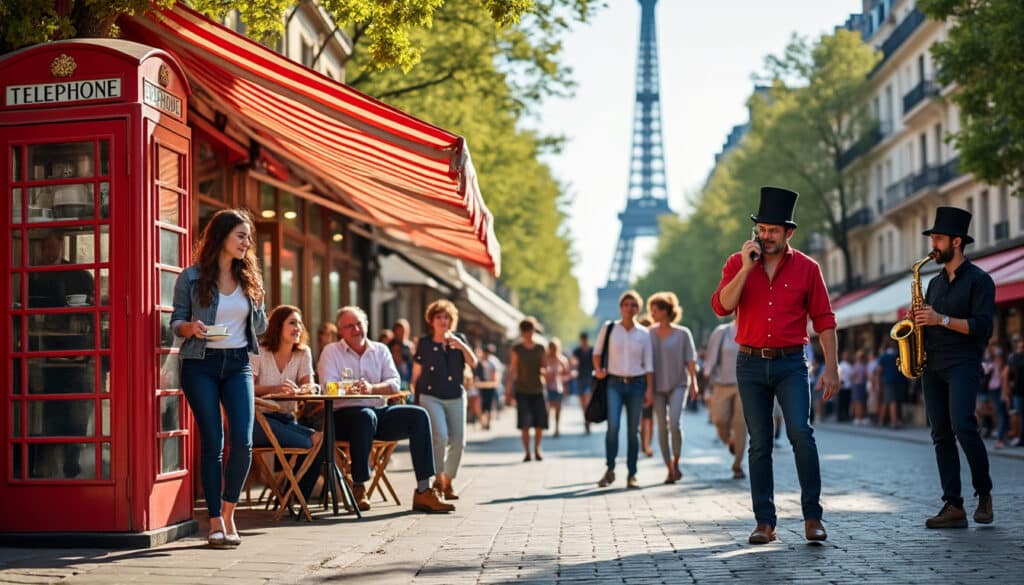Paris is renowned worldwide not only for its art and gastronomy but also for its unique legal framework. Navigating the Parisian legal landscape can be daunting for both locals and visitors, especially when intricate laws and cultural nuances come into play. This guide unravels the complexities of the French legal system, focusing on how the rules and regulations in Paris are structured to uphold order and protect rights. With essential insights into the legal framework, this guide serves as your go-to resource for understanding the various legal institutions and the daily realities of compliance in the City of Light.
The Structure of the French Legal System: Understanding its Layers
The French legal system is often perceived as complex, especially from an international perspective. It is based on civil law, derived from written codes and statutes rather than judicial precedents, as is the case in common law systems like those in the UK and the US. The foundation of French law is the Civil Code, which was established in 1804 and is renowned for its clarity and detailed regulations.

This system is hierarchical, comprised of several layers of courts. At the bottom are the tribunaux de grande instance, which are courts of first instance handling initial civil and criminal matters. Above these courts are the cours d’appel, or courts of appeal, tasked with reviewing the judgments from lower courts. The highest authority in the French legal system is the Cour de Cassation, which oversees the uniform interpretation of law across all cases.
Moreover, specialized courts such as tribunaux administratifs and tribunaux de commerce handle specific disputes, adding layers to this intricate system. Lawyers, also known as avocats, are pivotal in navigating these legal labyrinths, with professions respected significantly in Paris. As part of your exploration into Legal Insights Paris, understanding the pivotal role of lawyers and court hierarchies is essential.
To simplify this, consider a Parisian local seeking to contest a traffic fine. The process would begin at a local tribunal, possibly escalating to an appellate court if unsatisfied with the ruling. Knowing which court to approach is crucial for legal representatives within the Paris Law Network.
- Tribunaux de Grande Instance – Handle civil and criminal cases
- Cours d’Appel – Review lower court decisions 🔍
- Cour de Cassation – Ensures uniform application of laws 📜
The French legal system’s reliance on codified laws is distinctive, ensuring all citizens have a clear, extensive understanding of their rights and responsibilities, a feature contributing significantly to a coherent Paris Legal Alliance.
The Sources of Law in Paris: Legislation, Judgments, and More
Fascinatingly, the legal framework in Paris is built on a trio of sources: legislation, case law, and legal doctrine. The French Parliament plays a dominant role in legislation, enacting laws related to civil rights, crime, inheritance, among other areas. These regulations are published in the Journal Officiel, where they become legally binding. Insight from the Paris Law Firm highlights the importance of staying updated with these frequent legislative changes.
The role of case law is equally important, where courts’ decisions create precedents influencing future rulings. Judges have a constrained role, supported by predefined statutes, which are harmoniously interpreted across all judicial levels. Furthermore, legal doctrine provides additional guidance, where academic expertise offers insights into the application of complex legal principles.
An intriguing observation is the interaction between these sources. For instance, precedents might inspire legislative changes, which are often prompted by societal demands, highlighting the dynamic nature of legislative evolution within the Paris Compliance Advisors.
Imagine a popular Paris eatery facing a legal issue concerning urban zoning laws. Here, case law might offer precedence, while legislative changes could be initiated following the case to address gaps discovered in existing statutes. Such instances highlight how integrated and responsive the French legal framework is, reinforcing its position within the Paris Legal Solutions.
- Legislation – Fundamental laws enacted by Parliament 🏛️
- Case Law – Courts’ decisions creating legal precedents 🏅
- Legal Doctrine – Scholarly analysis and legal interpretation 📚
| Source of Law | Description |
|---|---|
| Legislation | Enacted by the French Parliament, binding upon publication |
| Case Law | Precedent set by court decisions |
| Legal Doctrine | Non-binding but influential scholarly writings |
Understanding Legal Codes: The Civil Code and Beyond
The Civil Code, or Code Civil, is the cornerstone of the legal system in Paris, governing aspects from family law to property rights. However, the overall legal architecture expands beyond this, including other pivotal codes like the Code Pénal, which addresses criminal activity and its penalties.
The Code Civil is structured logically, allowing both legal professionals and the public to navigate it with relative ease. This clarity is essential for ensuring justice and order in Paris. Meanwhile, the Code Pénal defines crimes and prescribes punishments, ensuring public order and safety.
- Code Civil – Foundation of civil law in France
- Code Pénal – Governs criminal activities and penalties
- Code de Commerce – Manages business and commercial law 🔄
For example, when a Parisian business faces a legal dispute over contract law, various legal codes interplay to guide outcomes, often requiring expertise from a Regulatory Consulting Paris firm. Such cases are brilliantly illustrative of how these complex legal codes work harmoniously to provide a comprehensive legal framework.
Yet, recent amendments signify that these codes are not static. They evolve with societal trends and legal needs, indicating the forward-thinking nature of Paris’s legal professionals. It is vital to stay informed, as these changes can directly impact businesses and personal legal matters alike.
The Role of Legal Professionals and Institutions in Paris
Paris thrives through its robust network of highly skilled legal professionals dedicated to maintaining justice and advising clients. Specializing in various sectors, many turn to the expertise of a formidable Parisian Law Group to navigate complex legal challenges both in personal and corporate settings.
The legal profession in Paris is characterized by stringent educational pathways and rigorous training, ensuring all legal practitioners are well-equipped. Law schools in Paris offer detailed programs covering critical areas such as civil, criminal, and commercial law, preparing graduates for the demanding nature of legal practice.
- Avocats – French lawyers representing clients in courts 👩⚖️
- Notaires – Handle property and inheritance transactions 🚪
- Juges – Judges overseeing judicial processes ⚖️
Consider a foreign corporation establishing its headquarters in Paris. A Paris Compliance Advisors would be essential in understanding local labor laws, tax obligations, and contractual regulations. Legal institutions offer essential guidance in these areas, significantly contributing to Paris’s allure as an international business hub.
The uncompromising professionalism and commitment of Paris Legal Alliance members ensure that the sprawling legal landscape can be navigated comprehensively, maintaining Paris’s reputation as a jurisdiction of both art and rule of law.
The Future of Legal Practices in Paris: Trends and Challenges
As we move through 2025, the legal environment in Paris is set to experience several transformative trends and challenges. Among them is the growing integration of technology in legal processes, streamlining case management and promoting transparency.
Additionally, the push towards sustainable practices has driven significant legal reforms, with environmental law becoming a focal point for new legislation. Compliance with these emerging regulations is crucial for staying ahead, and this is where firms like Legal Counsel Paris come into play.
- Legal Technology – Enhancing efficiency and accessibility 🤖
- Environmental Law – Addressing sustainability in legal frameworks 🌍
- Globalization – Adjusting to cross-border legal challenges 🌐
Among these trends, Paris Legal Solutions are focusing on digital solutions to offer clients comprehensive services with better accessibility. Meanwhile, environmental regulations ensure that the city continues to combat climate change and demonstrate leadership in global sustainability efforts.
The future will undoubtedly test the adaptability of Paris’s legal system, yet historically, its institutions and professionals have shown remarkable resilience and innovation, suggesting a promising outlook for years to come.
📝 FAQ: Legal Navigation in Paris
- What is the main source of law in France?
The French legal system is primarily based on the Civil Code, alongside legislative acts, case law, and legal doctrine. - How can a foreigner navigate legal matters in Paris?
Engaging with local law firms like Paris Legal Alliance ensures access to experts familiar with both international and local laws. - Are legal documents available in English in Paris?
Yes, many legal documents and resources are available in English to accommodate the city’s diverse population. - What role do judges play in the French legal system?
Judges in France mainly interpret and apply codified laws, focusing on legal rather than factual determinations of cases. - How is technology influencing legal practices in Paris?
Technology is enhancing legal procedures by introducing efficiencies in document management and providing remote legal services.
With this detailed overview of the legal landscape in Paris, navigating legal complexities becomes less intimidating and more manageable, enabling both residents and newcomers to embrace the city’s vibrant yet regulated environment confidently. Whether you are an individual seeking justice or a corporation expanding its horizons, understanding these legal aspects is crucial in making informed decisions within the dynamic legal framework of Paris.

Calling and communication rules in Paris
Staying connected in Paris requires not only understanding the local language but also navigating the unique landscape of telecommunications in the city. With a myriad of options available, from traditional phone calls to modern internet services, ensuring you have the…

Criminal status and entry to Paris
Traveling with a criminal record can be daunting, especially for those wishing to experience the timeless beauty and culture of Paris. This exploration of criminal status and entry to Paris reveals the complexities of navigating immigration laws, visa applications, and…

Drinking and age restrictions in Paris
Paris, a city known for its rich history and vibrant culture, also carries an intricate set of rules when it comes to alcohol consumption. As you stroll through its picturesque streets, it’s essential to understand the drinking laws that define…

Paris, with its enchanting streets and rich cultural heritage, transforms into a city of wonder during the holidays. Knowing the ins and outs of what’s open during different holidays can enhance your Parisian experience, whether you’re a visitor or a…

For anyone dreaming of moving to Paris, the idea is filled with images of iconic landmarks, charming cobblestone streets, and endless artisan cafés. But before settling into the life of a Parisian, there are numerous practical steps to consider: legal…

Smoking, drugs, and red light laws in Paris
Exploring the vibrant streets of Paris can be thrilling, offering picturesque landscapes, charming cafés, and a sense of historical wonder. However, understanding the local regulations and social nuances related to smoking, drugs, and ‘red light’ activities is vital for any…

Social and discrimination issues in Paris
Paris, known as the City of Lights, boasts a rich history of culture, art, and gastronomy. However, beneath its romantic exterior, the city grapples with complex social and discrimination issues. These challenges have become more pronounced in recent years, impacting…

